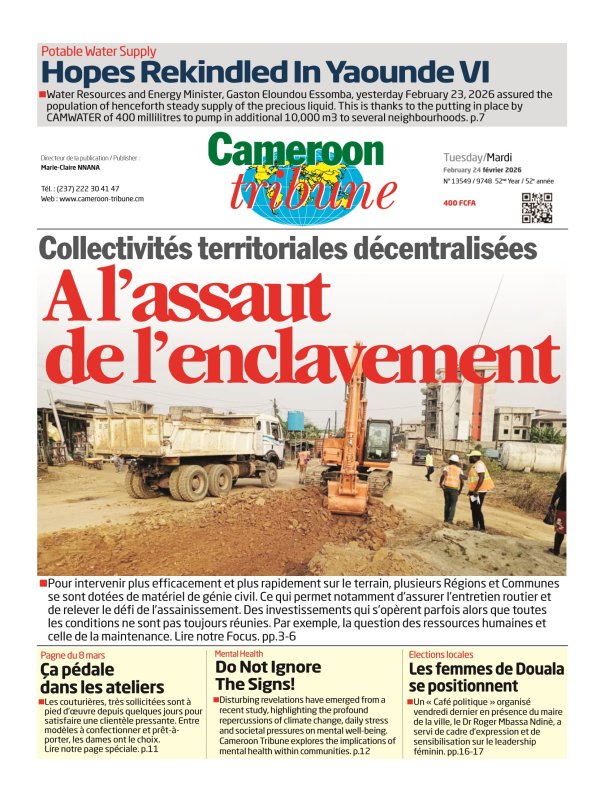Agriculture Dev’t: Realising This Lofty Dream!
- Par Godlove BAINKONG
- 12 Jun 2023 10:18
- 0 Likes
If an ambitious vision hatched by some ministries, and which is already out of their thinking box, is not allowed to witness a stillbirth like previous initiatives, Cameroon’s agricultural production could witness an evolution in no distant future. A joint project of the Ministries of Agriculture and Rural Development and Land Tenure to develop 400,000 hectares of land and install large-scale agricultural producers in the central plain, along the Batchenga-Ntui-Yoko-Tibati-Ngaoundere corridor is, to say the least, unprecedented. This could easily be the first giant and practical step to modernising agriculture and ensuring production in industrial scale.
The project’s literature suggests the initiative, the preparation of which has been underway since 2015, has been identified as a second-generation structuring project likely to accelerate the implementation of the growth strategy, the creation of decent jobs and the reduction of poverty. The “Agricultural Highways,” as the stimulating initiative is known, targets the implementation of agro-pastoral projects in the 584.8 km corridor with the State’s share amounting to FCFA 100 billion of the FCFA 300 billion total cost. It is said that the private sector, which will be selected through a call for expressions of interest, will have to invest FCFA 200 billion, going by their specifications. As such, the project will work towards the emergence of medium and large-scale farms and in so doing boosting agricultural production and productivity. A sharp revolution from the subsistent agriculture most of the country’s farmers have been subjected to owing to the small sizes of their farms and the rudimentary tools used. Consequently, they are left to produce only for their mouths and most of them do not even properly feed the people at their disposal. Hand-to-mouth agriculture it has been!
It is stated that in line with the import-substitution policy which government embraced some years back and which seeks to boost local production so as to scale down incessant imports, the initiative being developed has identified crops like rice, maize, palm oil and market garden produce to be significantly grown. The first phase of the project will involve securing and developing 400,000 hectares out of a potential 1.131 million hectares in the project area. Success in the first phase is therefore imperative as it would lay the foundation not only to developing the rest of the hectares therein, but also spreading the project’s tentacles to other production basins across the national territory as well as target other produce susceptible to developing the country’s agriculture. Huge potentials exists and simply await full expansion.
Stakeholders are hopeful that the 137,841 km2 land, once fully developed, will be made available to potential investors for optimum agricultural production in quality and quantity. And this is where the real issue lies. Underlining that the private sector will be selected through a call for expressions of interest is understood to mean that there will be competition. Those vested with the powers to select the final beneficiaries therefore have an arduous task to make the playing field level for all and that potential investors are selected based on their financial and technical capacities to develop the land and fetch the desired results. Resorting to the shameless influence peddling and or egocentric interest of the final decider to choose friends or those who can oil their lips better would only be killing a lofty dream. God forbid! It is also said that the vision plans to support the structuring of established producers, to enable the cooperative movement to become a genuine link in the chain of economic development. Support for established agricultural entrepreneurs is also in view and will encourage the development of agriculture based on a value chain approach and ensure that food and nutritional security are taken into account. There is also a plan to set up some 1,000 large-scale local and foreign private producers, with target to increasing the domestic supply of food products, among others. The Ministry of Land Tenure will be working to provide the land required for the entire project. Inception looks good as roles are clearly defined for all.
Observably, this is amazing and a hope-raising dream! The challenge remains materialising the vision and maximising the huge agricultural potentials the country has to ensure food self-sufficiency and safety. This would be walking the Head of State’s talk during the 2011 Agro-pastoral Show in Ebolowa when he said, “I am committing the ministries concerned to this path, without delay, and I want substantial results. I ask them to do everything possible to ensure our food security, to create jobs in rural areas, to reduce our imports and to develop our exports of agricultural products so that our agriculture in the broadest sense plays its role as a driving force of the national economy.”...
Cet article complet est réservé aux abonnés
Déjà abonné ? Identifiez-vous >
Accédez en illimité à Cameroon Tribune Digital à partir de 26250 FCFA
Je M'abonne1 minute suffit pour vous abonner à Cameroon Tribune Digital !
- Votre numéro spécial cameroon-tribune en version numérique
- Des encarts
- Des appels d'offres exclusives
- D'avant-première (accès 24h avant la publication)
- Des éditions consultables sur tous supports (smartphone, tablettes, PC)











Commentaires